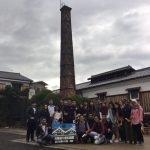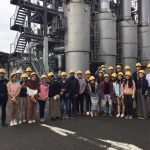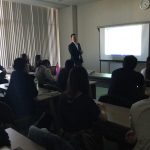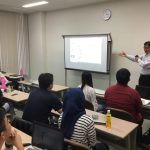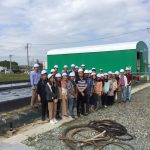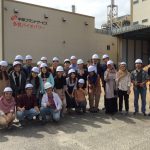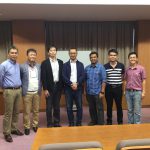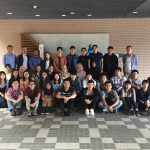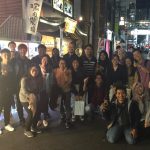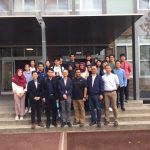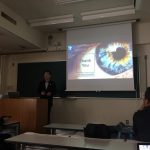
December 13, 2019, by Communications
Sakura Science Program in Kobe University
Day 1 – Gather at Kobe University, Grouping into 5 groups, Discussion for SDGs, Lab visit
Kobe University, Japan offers a five-days extraordinary programme “Sakura Science Programme” for undergraduate and postgraduate researchers from Malaysia, Taiwan, Indonesia and Thailand. This programme aims to nurture young researchers to develop a sustainable research mindset in correlation with the 17 goals from the Sustainable Development Goals (SDGs). This programme provides students with the current pioneer research conducted at Kobe University as well as emerging technologies developed by Japanese Industries. In addition, the programme provides students with a chance to experience Japanese culture.
7 October 2019 – The programme started at 9:00 a.m. when all the participants gathered at the main entrance of Kobe University and were welcomed by Professor Dr Chiaki Ogino. During the first session in the morning, Prof. Dr Ogino briefed the participants on what to expect throughout the Sakura Science Programme. We were then divided into five groups which consisted of participants from different countries. Then, all participants were asked to introduce themselves and this was followed by a short group discussion on a research topic that was related to the 17 goals of SDGs. The afternoon session consisted of a two-hour group discussion and a short presentation on the research topic discussed earlier among the lecturers and participants.
Day 2 – Factory tour of Sakae Gekkeikan and Bioethanol Plant in Kyoto
8 October 2019 – The following day’s morning session comprised a visit to Sakae Gekkeikan at Kyoto, Japan where we experienced the production of rice wine from Japanese rice. Sakae Gekkeikan museum is one of Japan’s preeminent sake companies, which opened in 1982. Sake is a popular rice wine (alcoholic beverage), made by the fermentation of rice. This production begins with the conversion of starch (from rice) to sugar and followed by the fermentation process where sugar is then converted into alcohol.
The afternoon session was a visit to the Bioethanol Plant in Kyoto. During this session where saw the production of bioethanol from wood/lignocellulosic waste from the Hokkaido, Akita and Hyogo prefectures. The method of bioethanol production from rice straw is roughly divided into three processes, namely: pre-treatment, saccharification and fermentation. In between these processes, the raw material is segregated into several particle sizes of wood chips. This is to ensure an effective pretreatment process using concentrated sulphuric acid can dissolve the rigid structure of lignocellulose into its monomers such as cellulose, hemicellulose and lignin. This process is followed by the saccharification process where the complex monomers are further broken down into monosaccharide components. Then, the fermentation process begins where the monosaccharide components are converted into alcohol. Lastly, the alcohol is separated using a distillation reactor into its respective hydrocarbon chains.
Day 3 – Greeting by Professor Dr Akihiko Kondo in Kobe University, Japan, Professor Dr John Chi-Wei Lan’s presentation, Individual presentation by participants on their research.
9 October 2019 – The morning session began with individual presentations by each participant on their research projects. This was followed by a presentation by Prof. Dr John Chi-Wei Lan from Yuan Ze University, Taiwan regarding his current research projects. He also shared his experience of opening a beer company at Yuan Ze University with his students, which won a few beer tasting competitions in Taiwan. We were then welcomed by Prof. Dr Kondo, who gave us a presentation on the importance of SDGs in the Sakura Science Programme.
Day 4 – Visit Chubu Plant Service, Visit to Mie University, Japan, Farewell party at night
10 October 2019 – The morning session comprised a visit to the Chubu Plant Service (CPS) which generates electric power mainly through biomass wastes. We have experienced efficient usage of energy where by-products like carbon dioxide and heat are utilised to cultivate microalgae (Euglena) for fish food. The biomass wastes are sourced from wood cuttings and 30% of the total biomass wastes are obtained from Japan. The concept of CPS is to reduce the environmental burden by using wood biomass fuel as the afforestation will absorb the carbon dioxide emissions generated through combustion. Sand is employed as a heating medium to burn the biomass at 700oC and the burning gases are controlled at 800oC to avoid the formation of thermal NOx.
10 October 2019 – The afternoon session included a visit to Mie University, which is renowned for courses in bioresource, fisheries and medicine. Prof. Dr Yutaka Tamaru presented interesting research about producing antibodies from goldfish genes. Mie University is also collaborating with CPS for the biomass power station as well as using sorghum as the renewable bioresource. We were excited to find out more about the discovery of transparent fish, known as “Toumei-Kingyo Mie-Mie”, by Mie University, which was reported in February 2010. Various researches and collaborations between Mie University and the industry have brought insights and improvement to the society in various areas. After the visit to Mie University, we travelled back to Sannomiya, Kobe by bus to have our farewell dinner. We learnt more about each other and had fun during dinner.
Day 5 – Greeting by Dean, Group presentation about SDGs, Ir. Dr Pau Loke Show’s presentation, Closing ceremony
11 October 2019 – On the last day of the Sakura Science Programme, the morning session began with greetings by Prof. Dr Ohmura Naoto, the Dean of Graduate School of Engineering and a brief introduction of all visiting lecturers. This was followed by the presentation of each group on SDGs. We were inspired by the ideas and innovations of students. The comments and feedback from all professors were much appreciated and taught us a lot to reach the goal of SDGs. Ir. Dr Pau Loke Show presented on the bio-separation process using Liquid Biphasic System after the students’ presentations. We had a fruitful experience in communicating with students from different countries and learning from professors who are experts in their fields. Lastly, we received a certificate for completing the programme and all participants took a photo with Prof. Dr Ogino for the closing ceremony.
We were amazed by the innovative and pioneering technologies in Japan as well as the culture from which we learnt how to improve society for a brighter future. We also enjoyed and made some new friends during the journey. We would like to thank the Japan Science and Technology Agency (JST), Prof. Dr Ogino and Kobe University for organising the Sakura Science Programme and we are very grateful to Ir. Dr Pau Loke Show for giving us the opportunity to participate in this prestigious exchange.
- Up to Down/Left to Right: (1st row, 4th person: Ir. Dr. Pau Loke Show; 1st row, 7th person: Kuan Shiong Khoo; 2nd row, 7th person: Dr. Hui Yi Leong; 2nd row, 8th person: Shir Reen Chia)
- Left to Right: (9th person: Ir. Dr. Pau Loke Show; 13th person: Kuan Shiong Khoo; 15th person: Dr. Hui Yi Leong; 16th person: Shir Reen Chia)
- Up to Down/Left to Right: (1st row, 1st person: Dr. Hui Yi Leong; 1st row, 2nd person: Shir Reen Chia; 1st row, 6th person: Ir. Dr. Pau Loke Show; 2nd row, 1st person: Kuan Shiong Khoo)
- Up to Down/Left to Right: (1st row, 9th person: Shir Reen Chia; 1st row, 10th person: Dr. Hui Yi Leong; 1st row, 14th person: Ir. Dr. Pau Loke Show; 1st row, 15th person: Kuan Shiong Khoo)
- Up to Down/Left to Right: (1st row, 3rd person: Kuan Shiong Khoo; 1st row, 4th person: Ir. Dr. Pau Loke Show; 2nd row, 3rd person: Shir Reen Chia; 2nd row, 4th person: Dr. Hui Yi Leong)
- Left to Right: (2th person: Prof. Dr. Yutaka Tamaru; 7th person: Ir. Dr. Pau Loke Show)
- Up to Down/Left to Right: (1st row, 1st person: Ir. Dr. Pau Loke Show; 1st row, 2nd person: Kuan Shiong Khoo; 2nd row, 4th person: Shir Reen Chia; 2nd row, 5th person: Dr. Hui Yi Leong)
- Up to Down/Left to Right: (1st row, 1st person: Shir Reen Chia; 2nd row, 3rd person: Dr. Hui Yi Leong; 2nd row, 6th person: Kuan Shiong Khoo; 2nd row, 9th person: Ir. Dr. Pau Loke Show)
- Up to Down/Left to Right: (1st row, 1st person: Ir. Dr. Pau Loke Show; 1st row, 3rd person: Prof. Dr. Ohmura Naoto; 3rd row, 3rd person: Dr. Hui Yi Leong; 3rd row, 4th person: Shir Reen Chia; 3rd row, 5th person: Kuan Shiong Khoo)
-
Post a comment

